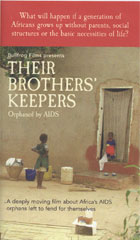
Their Brothers’ Keepers: Orphaned by AIDS 2005
Distributed by Bullfrog Films, PO Box 149, Oley, PA 19547; 800-543-FROG (3764)
Produced by Green Lion Productions and Catherine Mullins
Directed by Green Lion Productions
VHS, color, 56 min.
Sr. High - Adult
African Studies, Child Development, Death & Dying, Human Rights, Sociology
Date Entered: 12/21/2005
Reviewed by Thomas J. Beck, Auraria Library, University of Colorado at DenverAfrica has endured more than its share of tragedy in the last several centuries. Now, it is suffering one of its worst. Because of the AIDS virus, people in their 20’s, 30’s and 40’s across Africa are dying in huge numbers. This is a tragedy in its own right, but these deaths have an even more devastating consequence. Millions of children have been left orphaned! In many towns and villages on the continent children are forced to fend for themselves, and care for their younger siblings, because all of the adults in their immediate family are dead. Africa is on its way to becoming a continent of the very young and the very old. This film chronicles the lives of some of these children, and the efforts by people both inside Africa and out, to help them.
Lusaka, the capital of Zambia, is a city surrounded by a number of impoverished shantytowns, locally called “compounds.” One of these is Chazanga, where Dorris and her brother Paul live. She is 12 and he is 14. Their mother is dead, having succumbed to AIDS some years ago. The two children are now forced to provide for themselves, as well as their three younger brothers. They do piecework to survive, but it is in short supply, and as a consequence they and their siblings are often hungry and behind on their rent. Paul and Dorris have to take turns going to school, so one of them can stay home and watch the other children. Aside from the work they do to pay the rent and put food on the table, they also have the regular parenting duties to attend to. They feed and wash the little ones and tuck them into bed at night, just as their mother would have done. They are surprisingly upbeat despite their dire circumstances, though they often succumb to sadness and desperation. They would not have been able to survive without the help of Bwafwano Home Base Care, a local organization that teaches AIDS orphans how to fend for themselves and care for younger siblings. Beatrice Kwenda, with this organization, let their entire family live with her for several months, so she could teach Dorris and Paul the necessary skills. She also had to care for the younger children, who she found were seriously ill.
Bwafwano Home Base Care has helped other children like Paul and Dorris, and this film shares some of their stories as well. The situation is one, invariably, of older children caring for younger ones, and often for sick and dying parents. Sometimes Grandparents are called on to care for these children, at least for a while, but they too are often sick and dying, or live in places to far away for the children to reach them given the expense involved. Organizations like Bwafwano Home Base Care can give assistance to only a limited number of children, and even there they can only provide training and moral support. They do not have the resources to give the children either food or money. Many children can shoulder these new burdens and responsibilities, and many more cannot. They become street children, and turn to crime or prostitution to provide for themselves. Those engaged in prostitution are only increasing their chances of becoming AIDS victims, and possibly, of passing the virus on to their own children and loved ones. Under such circumstances the AIDS pandemic only grows.
Into this grim picture the filmmakers interject a few rays of hope. Zambia, like other African countries, is putting more and more money into AIDS awareness drives. These teach that only abstinence or safe sex can protect one from AIDS, and that it is best to stay with one sexual partner, if you have sex at all. Dorris, Paul and their brothers are transported to their grandmother’s village, far from Chazanga, thanks to contacts made for them by Bwafwano Home Base Care. There they can start a new life, with their grandmother and aunts to care for them. The filmmakers share other hopeful stories as well. Nevertheless, the film never wavers from its overriding theme, that a mind boggling tragedy is now unfolding in Africa and that the international community is doing too little to stop it. A whole generation of African children are growing up without parents. Many, if not most, have never known love, comfort or support. What kind of future can such children make for themselves and their countries? There is little they can do alone. Cheap anti-viral drugs from the developed world could save millions of lives, and keep millions more children from becoming orphans. Such drugs unfortunately, are in short supply for such impoverished countries as these. Where they are available, the health care infrastructure to provide them is ill equipped to do so. Coping with the problems caused by AIDS in Africa is a daunting task that will take a great deal of effort and money to address. This film asks if the developing world, which can always find the resources to wage wars that cost billions of dollars, has the will and the compassion to defeat this particular enemy.
This film is engrossing and very well paced. Its picture and sound qualities are good. It is provided with an effective narration in English. The bulk of the film shows the children’s day to day lives, and is interspersed with interviews with them, their relatives, aid workers, doctors and various experts on AIDS and AIDS orphans. The children and many others in the film do not speak English, and in those instances what they say is subtitled.